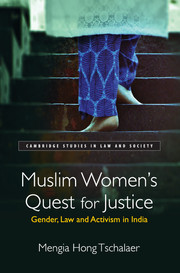Book contents
- Frontmatter
- Dedication
- Contents
- Preface
- Acknowledgements
- Abbreviations
- 1 From Legal Binaries to Configurations: Muslim Women's Rights Activism in South Asia
- 2 A Multidimensional Approach to Muslim Women's Activism: Mapping the Legal Landscape in the City of Lucknow
- 3 Destabilising Gendered Proprieties: Muslim Women's Visibility within the Public Space
- 4 Vying for a Gender Just Islamic Marriage Contract: Women's Legal Spaces
- 5 Legal Realities: Doing Gender Justice from Below
- 6 Muslim Women's Quest for Justice: Theoretical Implications and Policy Suggestions
- 7 Appendices: Model-Nikahnamas
- 8 Glossary
- 9 Bibliography
- 10 Index
3 - Destabilising Gendered Proprieties: Muslim Women's Visibility within the Public Space
Published online by Cambridge University Press: 08 February 2018
- Frontmatter
- Dedication
- Contents
- Preface
- Acknowledgements
- Abbreviations
- 1 From Legal Binaries to Configurations: Muslim Women's Rights Activism in South Asia
- 2 A Multidimensional Approach to Muslim Women's Activism: Mapping the Legal Landscape in the City of Lucknow
- 3 Destabilising Gendered Proprieties: Muslim Women's Visibility within the Public Space
- 4 Vying for a Gender Just Islamic Marriage Contract: Women's Legal Spaces
- 5 Legal Realities: Doing Gender Justice from Below
- 6 Muslim Women's Quest for Justice: Theoretical Implications and Policy Suggestions
- 7 Appendices: Model-Nikahnamas
- 8 Glossary
- 9 Bibliography
- 10 Index
Summary
'One thousand four hundred years ago, at the time of the prophet Muhammed, Muslim women participated in wars, worked as nurses and doctors, owned and operated businesses and were actively involved in public religious life. I am fighting to get our quranic rights back and to make Muslim women visible in public again!
These are words of Naish Hasan (BMMA), pronounced in a personal conversation in winter 2010. Hasan's claim to work towards women's reintegration into the public space, using Islamic history and ideology as an explanatory framework, is a central plank in the agenda of Muslim women activists in the city of Lucknow. In this respect, this short narrative succinctly captures contemporary Muslim women's rights activists’ endeavour to stretch the gendered boundaries of the politically contested public legal space, as discussed in the previous chapter, via struggles over competing definitions of religious knowledge and authority. They view their exclusion from public religious and political life less in terms of an ideological dictate than as the Muslim clergy's decidedness to consolidate political power structures through patriarchal and paternalistic interpretations of the Islamic texts. For example, Shaista Amber (AIMWPLB) insists that the clergy's interpretations of the Quran and the Hadith, which prevent Muslim women from becoming a qazi (judge), a mufti (law expert), an alima (scholar), or priest and which prevent them from praying in public mosques, need to be challenged. In a similar vein, Shehnaz Sidrat (Bazme Khawateen) also takes issue with patriarchal interpretations depicting women's active participation in the public space as an onslaught on their modesty and, hence, as a religious 'sin. Kecentfatwas released by the eminent Lucknow-based Sunni seminaries Darul Uloom Nadwatul Ulama reflect the patriarchal leaning in the ulema's interpretations of the religious texts. These fatwas strongly advise women against becoming a qazi (judge), a mufti (law expert), or an alima (scholar), and discourage them from praying in public mosques. Calling for a return to the 'true Islam', as conveyed in Hasan's quote above, Sidrat points to the opportunities Islam offers for women to engage in public life, saying: ‘As long as we follow the rules of purdah [concept of Islamic modesty and shyness], Muslim women are free to work, become politicians and activists. No one can stop us!’
- Type
- Chapter
- Information
- Muslim Women's Quest for JusticeGender, Law and Activism in India, pp. 81 - 103Publisher: Cambridge University PressPrint publication year: 2017

